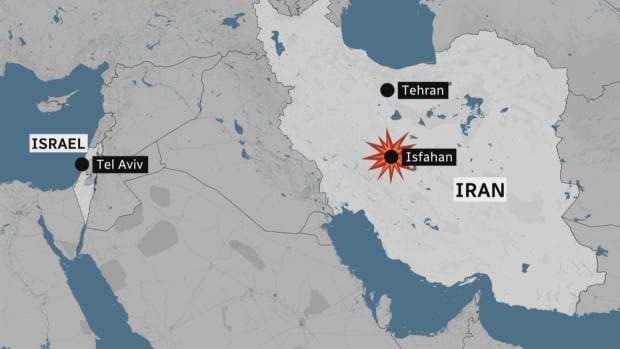Commercial flights began diverting from their routes over western Iran early Friday morning without explanation as one semiofficial news agency in the Islamic Republic claimed there had been explosions heard over the city of Isfahan, while state television acknowledged “loud noise” in the area.
The move comes as tensions remain high in the wider Middle East after Iran’s missile-and-drone attack on Israel last weekend — an event that was itself retaliation against a suspected Israeli strike in Syria on April 1, which claimed the lives of several senior Iranian military commanders.
Multiple U.S. news agencies — including ABC News, CBS News and the New York Times — reported that Israeli missiles had struck Iran, citing unnamed U.S. and Israeli officials in their reporting.
An Iranian official told Reuters that the explosions heard in Isfahan were a result of the activation of Iran’s air defence systems, noting that no missile attack was carried out against Iran.
But Hossein Dalirian, a spokesperson for Iran’s civilian space program, said on the X social media platform that several small “quadcopter” drones had been shot down. A state television reporter in Isfahan said the same in a live report, saying “several small drones were flying in the sky over Isfahan, which were fired at.”
Israel has vowed to respond to Iran’s weekend attack, leaving the region bracing for further escalation after months of fighting in Gaza.
Allies have urged Israel to hold back on any response to the attack that could spiral, while Iran has said it would take considerably more severe action “should the Israeli regime make another mistake.”
Israeli leaders are trying to build a case that ignoring Iran’s unprecedented drone and missile attack is not an option, as many of the country’s allies urge de-escalation.
Israel and Iran have been on a collision course throughout Israel’s six-month war against Hamas militants in the Gaza Strip.
The war erupted after Hamas and Islamic Jihad, two militant groups backed by Iran, carried out a cross-border attack on Oct. 7 that killed 1,200 people in Israel and kidnapped 250 others, according to Israeli tallies. Gaza’s health department says more than 33,000 Palestinians have been killed in retaliatory attacks by Israel, and roughly 80 per cent of Palestinians in Gaza have been displaced by the conflict.
Airspace may have been closed
Dubai-based carriers Emirates and FlyDubai began diverting flights around western Iran about 4:30 a.m. local time. They offered no explanation, though local warnings to aviators suggested the airspace may have been closed.
Iranian state television began a scrolling, on-screen alert acknowledging a “loud noise” near Isfahan, without immediately elaborating.
The semiofficial Fars news agency reported on the sound of explosions over Isfahan near its international airport. It offered no explanation for the blast.
Iran later announced it grounded commercial flights in Tehran and across areas of its western and central regions. Loudspeakers informed customers of the incident at Imam Khomeini International Airport in Tehran, online videos purported to show. Iran later restored normal flight service, authorities said.
Isfahan is home to a major airbase for the Iranian military, as well as sites associated with its nuclear program such as its underground Natanz enrichment site — the centrepiece of Iran’s uranium program — that has been repeatedly targeted by suspected Israeli attacks. However, state television described all sites in the area as “fully safe.”
Iran’s nuclear program has rapidly advanced to producing enriched uranium at nearly weapons-grade levels since the collapse of its atomic deal with world powers after former U.S. president Donald Trump withdrew America from the accord in 2018.
While Iran insists its program is for peaceful purposes, Western nations and the International Atomic Energy Agency (IAEA) say Tehran operated a secret military weapons program until 2003. The IAEA has warned that Iran now holds enough enriched uranium to build several nuclear weapons if it chose to do so, though the U.S. intelligence community maintains Tehran is not actively seeking the bomb.
The Israeli military said that warning sirens that sounded early on Friday in northern Israel were a false alarm.






